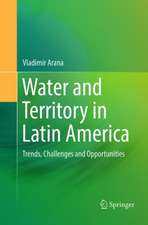A Critical Approach to International Water Management Trends: Policy and Practice: Palgrave Studies in Water Governance: Policy and Practice
Editat de Christian Bréthaut, Rémi Schweizeren Limba Engleză Hardback – 17 oct 2017
Informed by empirically grounded research, each chapter of this work engages with a particular approach, concept or theory. Together, they provide a nuanced picture of trends in water management that require universal remedies and global norms.
| Toate formatele și edițiile | Preț | Express |
|---|---|---|
| Paperback (1) | 685.98 lei 38-44 zile | |
| Palgrave Macmillan UK – 22 aug 2018 | 685.98 lei 38-44 zile | |
| Hardback (1) | 735.38 lei 43-57 zile | |
| Palgrave Macmillan UK – 17 oct 2017 | 735.38 lei 43-57 zile |
Preț: 735.38 lei
Preț vechi: 896.81 lei
-18% Nou
Puncte Express: 1103
Preț estimativ în valută:
140.71€ • 147.31$ • 116.43£
140.71€ • 147.31$ • 116.43£
Carte tipărită la comandă
Livrare economică 07-21 aprilie
Preluare comenzi: 021 569.72.76
Specificații
ISBN-13: 9781137600851
ISBN-10: 1137600853
Pagini: 278
Ilustrații: XI, 305 p. 24 illus., 17 illus. in color.
Dimensiuni: 148 x 210 mm
Greutate: 0.67 kg
Ediția:1st ed. 2018
Editura: Palgrave Macmillan UK
Colecția Palgrave Macmillan
Seria Palgrave Studies in Water Governance: Policy and Practice
Locul publicării:London, United Kingdom
ISBN-10: 1137600853
Pagini: 278
Ilustrații: XI, 305 p. 24 illus., 17 illus. in color.
Dimensiuni: 148 x 210 mm
Greutate: 0.67 kg
Ediția:1st ed. 2018
Editura: Palgrave Macmillan UK
Colecția Palgrave Macmillan
Seria Palgrave Studies in Water Governance: Policy and Practice
Locul publicării:London, United Kingdom
Cuprins
1. Taking-Up Practical and Intellectual Challenges Posed by International Water Management Trends: Some Introductory Remarks; C.Bréthaut and R.Schweizer.-
2. Avoiding the Commons Trap: An Exploration of Local Community Governance of Water in Valais, Switzerland; R.Schweizer.- 3. Integrated Water Resources Management as a Compromise: Renewing the Water Act in the Canton of Fribourg, Switzerland; A.Buchs.- 4. Transboundary Water Management: From Geopolitics to a Non-State Analytical Perspective: The Case of the Rhône river; C.Bréthaut.- 5. From Multi-Level Governance to Scalar Politics: Water Community Networks Challenging Neo-Extractivist Governmental Institutions in Ecuador; E.Dupuits.- 6. Exploring the Democratic Legitimacy of Privatization in the Water Sector: Two Cases in Switzerland; E.Lieberherr.- 7. Governing Water with Market-Based Instruments: Preferences and Skepticism in Switzerland; F.Metz & P.Leifeld.- 8. Climate Change Adaptation as a New Global Norm in the Water Sector? Between Symbolism and Dilution; J.Dupuis.- 9. Water Security as a Normative Goal or as a Structural Principle for Water Governance; T.Bolognesi & S.Kluser.- 10. Politicizing the Water-Energy Nexus. Hydropower and Instream Values in Two Swiss Cantons Water Strategies; L.Tonka.- 11. From the Promises of International Water Management Trends to the Reality of Policies and Practices: Some Conclusive Thoughts; R.Schweizer & C.Bréthaut.
Notă biografică
Christian Bréthaut is a Senior Researcher at the Institute for Environmental Sciences, University of Geneva, Switzerland. He leads the Education and Knowledge component of the Geneva Water Hub and co-leads the UNESCO Chair on Hydropolitics from the University of Geneva.
Rémi Schweizer is a Senior Researcher and Lecturer at the University of Lausanne and ETH Zürich. His research focuses on environmental and food governance, with a particular interest on power relations, policy implementation and innovation, and local community governance.
Textul de pe ultima copertă
This edited volume provides a critical discussion of particular trends that are widely recognised to influence water management by comparing them with what is actually happening in the field. Among others, these trends include water security, adaptive or integrative management, and the water-energy-food nexus, which are often presented as essential means to reaching more sustainable and resilient water use. However, the extent to which these trends have managed to structure concrete practices in water management remains uncertain.
Informed by empirically grounded research, each chapter of this work engages with a particular approach, concept or theory. Together, they provide a nuanced picture of trends in water management that require universal remedies and global norms.
Informed by empirically grounded research, each chapter of this work engages with a particular approach, concept or theory. Together, they provide a nuanced picture of trends in water management that require universal remedies and global norms.
Caracteristici
Provides a critical discussion of international water management concepts and trends Analyses water management using empirical research on water governance in Switzerland Considers the extent concepts and forms of governance of water management have structured practises in the field




















